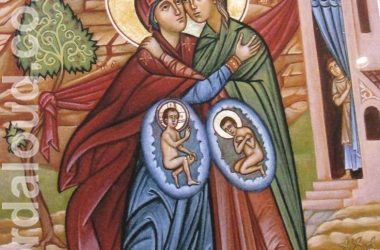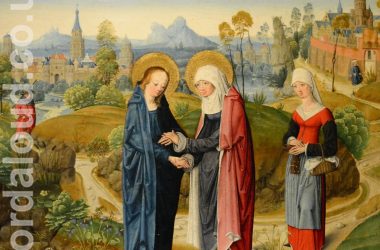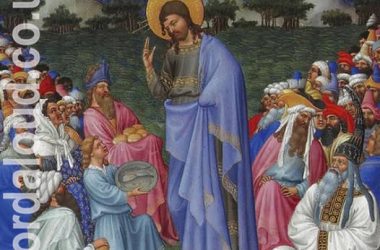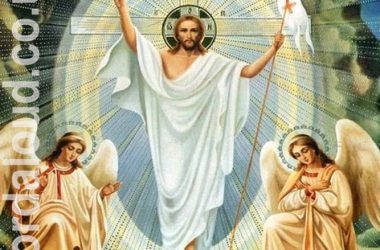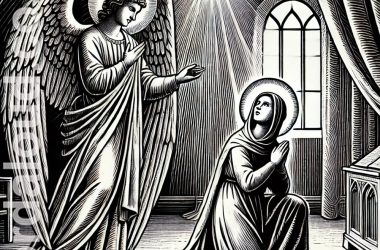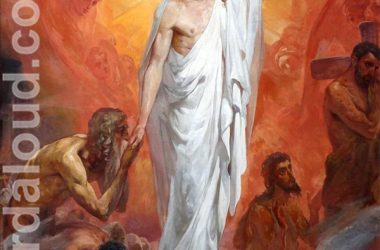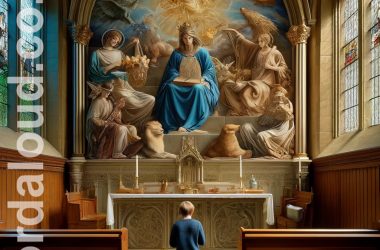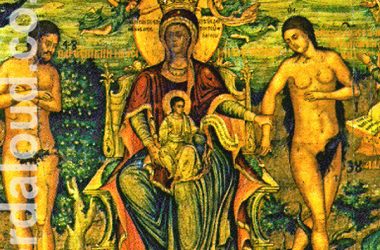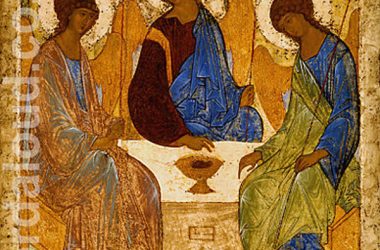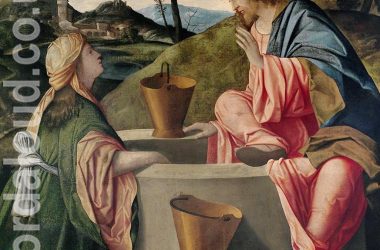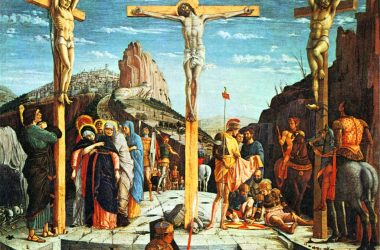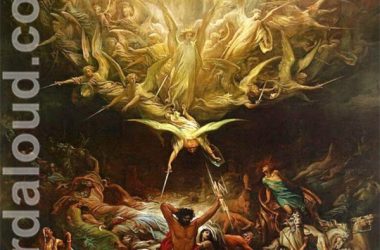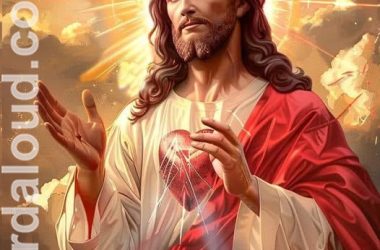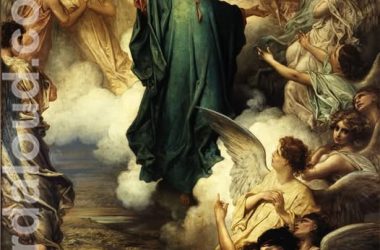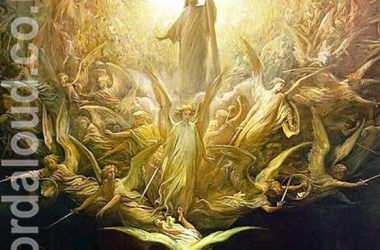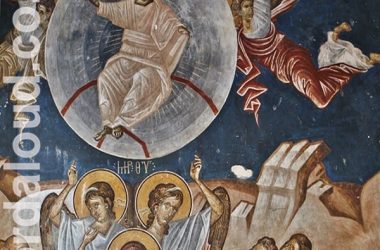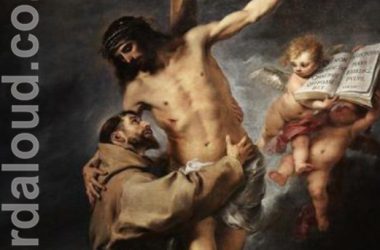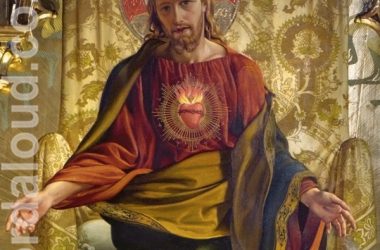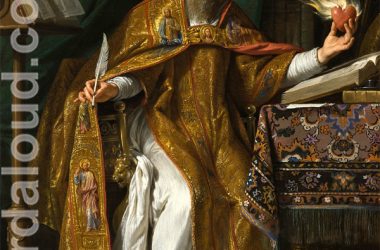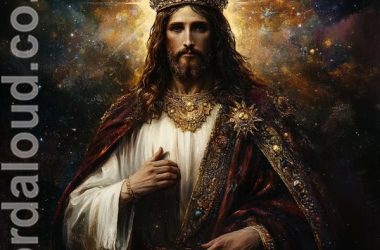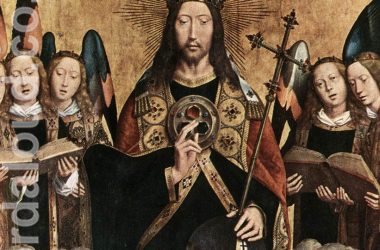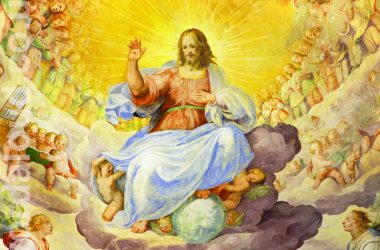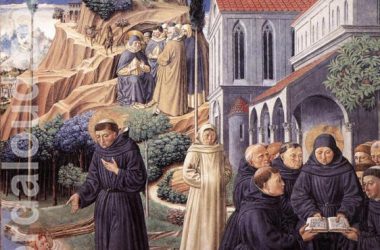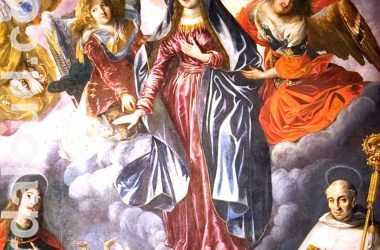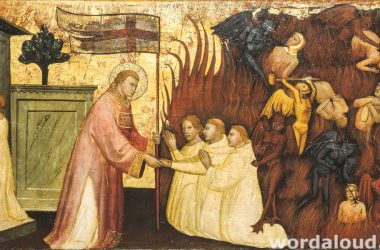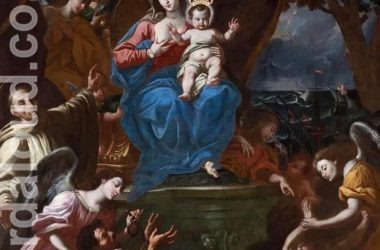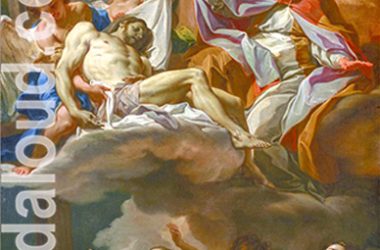Saint Bede’s commentary follows the structure of Mary’s song the Magnificat in Luke 1:46–55 and explains the song with close attention to Scripture. Bede treats the Magnificat both as Mary’s personal thanksgiving and as a proclamation that concerns Israel and the fulfilment of God’s promises [ … ]
Office Of Readings | Advent December 21st | A Reading From The Commentary Of Saint Ambrose On Saint Luke’s Gospel | The Visitation Of The Blessed Virgin Mary
In this reading, Saint Ambrose reflects on the account of the visitation in Luke’s Gospel, where Mary goes to Elizabeth after the annunciation. He begins by explaining why the angel Gabriel mentioned Elizabeth’s pregnancy. It served as confirmation of God’s promise, not because Mary doubted, but to show that what God wills cannot be limited by age or circumstance [ … ]
Office Of Readings | Advent December 20th | A Reading From The Homilies Of Saint Bernard In Praise Of The Virgin Mother | The Whole World Awaits Mary’s Reply
In this reading, Bernard of Clairvaux reflects on the moment of the annunciation, focusing on Mary’s reply to the angel Gabriel. The reading does not retell the biblical narrative in a descriptive way but pauses at the moment before Mary speaks, treating her response as a decisive point in salvation history [ … ]
Office Of Readings | Advent December 19th | A Reading From The Treatise Of Saint Iranaeus Against The Heresies | The Operation Of The Redeeming Incarnation
This reading sets out a central theme in the theology of Saint Irenaeus: the relationship between God and humanity as one of action and reception. God acts; human beings receive. God’s glory is shown not apart from humanity, but in humanity restored and brought to fulfilment [ … ]
Office Of Readings | Advent December 18th | A Reading From The Epistle To Diognetus | God Has Revealed His Love Through His Son | God The Father, God The Son
This reading explains how God makes himself known to humanity. The reading begins by stating that God cannot be seen or known directly, but is revealed through faith. Knowledge of God is therefore not the result of human effort or observation, but of God’s own initiative [ … ]
Office Of Readings | Advent 17th December | A Reading From A Letter Of Pope Saint Leo The Great | The Mystery Of Our Reconciliation With God | True Humanity Of Jesus Christ
This reading explains why the true humanity of Jesus Christ is essential for salvation. Saint Leo insists that it is not enough to say that Jesus was human in a general sense. Jesus must be recognised as truly belonging to human history, descended from the line traced in the Gospels [ … ]
Office Of Readings | Advent Tuesday Week 3 | A Reading From The Imitation Of Christ | Of Humble Submission, Of The Good, Peaceable Man
This reading concerns the interior discipline required for humility and peace. It begins by redirecting attention away from other people and towards God. The question is not who supports us or opposes us, but whether our actions are aligned with God. A clear conscience before God is presented as the primary form of security [ … ]
Office Of Readings | Advent Monday Week 3 | A Reading From The Treatise By William Of Saint-Thierry On Contemplating God | He Loved Us First
William of Saint-Thierry reflects on salvation not as something we achieve, but as something we receive. From the beginning, he insists that God’s dominion is not oppressive power but saving love. To belong to God is already to be rescued, because serving God means being held within God’s care [ … ]
Office Of Readings | Advent Sunday Week 3 | A Reading From A Sermon By Saint Augustine | John The Baptist Is The Voice, And Jesus Christ Is The Word
Saint Augustine uses a simple but profound image to explain the relationship between John the Baptist and Christ: John is the voice, Christ is the Word. The image allows Augustine to show both the greatness of John’s mission and its necessary limitation. John’s role is essential, but it is temporary; Christ’s is eternal [ … ]
Office Of Readings | Advent Saturday Week 2 | A Reading From A Sermon By Blessed Isaac Of Stella, Abbot | Mary And The Church
Saint Isaac of Stella reflects on the deep unity between Christ, Mary, the Church, and the individual Christian. His central conviction is that God’s saving work is one, though it is shared in different ways. What is true of Christ is extended to those who belong to him; what is true of Mary is reflected in the Church; and what is true of the Church touches each believer [ … ]
Office Of Readings | Advent Friday Week 2 | A Reading From The Treatise Of Saint Irenaeus Against The Heresies | On Eve And Mary
Saint Irenaeus sets before us one of the earliest and most important Christian ways of understanding salvation: God heals humanity by retracing its steps. What was damaged at the beginning is not abandoned but restored, and it is restored in a way that respects both human freedom and God’s justice [ … ]
Office Of Readings | Advent Thursday Week 2 | A Reading From A Sermon By Saint Peter Chrysologus | Love Desires To See God
Saint Peter Chrysologus reflects on the long history of God’s dealings with humanity and sees one thread running through it all: God counters human fear with love. When the world fell into sin, God did not abandon it or treat it only with justice. Instead, he drew near with tenderness, guiding, calling, comforting, and reshaping hearts so that love—not fear—would be the foundation of worship [ … ]
Office Of Readings | Advent Wednesday Week 2 | A Reading From Saint Augustine’s Discourses On The Psalms | God’s Promises Are Given To Us Through The Son
Saint Augustine sets before us the great pattern of God’s dealings with humanity: first the time of promise, then the time of fulfilment. The prophets spoke God’s pledges across the centuries, and John the Baptist concluded this long preparation. With Christ’s coming, the promises enter their moment of completion. God has not changed, but the stage of his plan has moved from expectation to realisation [ … ]
Office Of Readings | Advent Tuesday Week 2 | A Reading From Lumen Gentium, The Second Vatican Council’s Dogmatic Constitution On The Church | The Eschatological Character Of The Pilgrim Church
The reading sets before us the Church’s life in its full horizon. The reading begins by reminding us that the Church is called to holiness, and that this holiness will reach its completion only in heaven. The Church already belongs to Christ, and already receives his grace, but its true perfection lies ahead, when all things are renewed in Jesus. In that renewal, creation itself will be perfected, for the world and the human family are bound together in God’s plan. What began in Jesus Christ will one day embrace the whole of creation [ … ]
Office Of Readings | Advent Monday Week 2 | A Reading From The Ascent Of Mount Carmel By Saint John Of The Cross | God Has Spoken To Us In Christ
Saint John of the Cross reflects on the difference between the time before Jesus Christ and the time after Jesus’ coming. He begins by recalling that in the ancient law, prophets and priests needed revelations, visions, and signs. This was not a weakness but a necessity: the foundation of faith had not yet been laid, and the gospel had not yet been spoken in its fullness. God therefore met them in many ways—through images, symbols, and partial glimpses. Everything God revealed then pointed toward something greater that had not yet arrived [ … ]
Office Of Readings | Advent Sunday Week 2 | A Reading From The Commentary On Isaiah By Eusebius Of Caesarea | A Voice Of One Crying In The Wilderness
Eusebius reads Isaiah as a map of the gospel: a prophecy pointing ahead to John the Baptist, to Christ’s appearance, and to the mission of those who would later preach Christ to the world. He pays close attention to the detail that the voice cries not in the city but in the wilderness. For him this matters, because the wilderness symbolises the place where God is not expected, where the ground is rough, where paths have never been cleared. Eusebius sees this as an image of the world before the gospel, a world without the knowledge of God [ … ]
Office Of Readings | Advent Saturday Week 1 | A Reading From The Treatise Of Saint Cyprian On The Value Of Patience | We Hope For What We Do Not See
Saint Cyprian reflects on something very ordinary and very difficult: waiting. He insists that patience is not just a virtue floating on its own but is a necessary companion to faith and hope. Faith looks to God; hope leans toward what God has promised; but patience is what keeps both alive in the long spaces where nothing seems to be happening [ … ]
Office Of Readings | Advent Friday Week 1 | A Reading From The Proslogion Of Saint Anselm | A Rousing Of The Mind To The Contemplation Of God
Saint Anselm expresses a very personal kind of prayer — not analysing God from a distance, but putting into words the restless desire of a believer who knows that God is real, yet not yet fully seen. For Anselm, faith naturally awakens longing, and longing draws the soul deeper into God [ … ]
Office Of Readings | Advent Thursday Week 1 | A Reading From Saint Ephraem’s Commentary On The Diatessaron | Keep Watch: He Is To Come Again
Saint Ephraem reflects on why Christ chose not to reveal the day or the hour of his return. For Ephraem, this hiddenness is not meant to create fear but to preserve longing and vigilance. If the exact time were known, he says, the desire for Christ would fade and the urgency of Christian living would weaken. By keeping the time concealed, Christ invites every generation to live as though he might come today. This keeps faith attentive and the heart awake [ … ]
Office Of Readings | Advent Wednesday Week 1 | A Reading From A Sermon By Saint Bernard | The Word Of God Will Come Within Us
Saint Bernard returns us to the core Advent mystery: Christ comes to us not only in history and at the end of time, but also now—quietly, inwardly, transforming the heart. Bernard’s teaching is characteristically clear and architectural: three comings, three modes of divine presence, three points along the path of Christian life. Yet the emphasis is unwaveringly experiential. Bernard is not giving us a speculative map but a description of how grace actually works in the soul [ … ]
Office Of Readings | Advent Tuesday Week 1 | A Reading From The Orations Of Saint Gregory Nazianzen | The Wonder Of The Incarnation
Saint Gregory Nazianzen, known in the Christian tradition as the Theologian, is one of the greatest voices of the early Church on the mystery of the Incarnation. Few writers speak with such reverence, precision, and lyrical force about the identity of Christ. This reading is a condensed expression of his lifelong insistence on one central truth: only the full, undiminished God could save us, and therefore the One who became human for us is truly God, truly man, united in one person [ … ]
Office Of Readings | Advent Monday Week 1 | From A Pastoral Letter By Saint Charles Borromeo, Bishop | The Season Of Advent
Saint Charles Borromeo reflects on Advent as the ‘acceptable time’, drawing from Saint Paul’s language to describe a season charged with divine initiative. His tone is pastoral and earnest, urging the faithful not merely to recall a historical event but to participate anew in the grace that Christ’s coming has unleashed. For Saint Charles, the whole mystery of salvation is concentrated in this season: the Father’s mercy, the sending of the Son, the overthrow of Satan’s tyranny, the revelation of truth, the training in virtue, and the inheritance of eternal life. Advent is therefore not only a commemoration but a living conduit of God’s saving work [ … ]
Office Of Readings | Advent Sunday Week 1 | A Reading From The Catecheses Of Saint Cyril Of Jerusalem | The Twofold Coming Of Jesus Christ
Saint Cyril presents the Christian confession not as a remembrance of a single event but as the acknowledgement of two distinct comings of Christ. The first has already taken place in humility; the second is to come in manifest glory. This double perspective shapes both Christian faith and Christian waiting [ … ]
Office Of Readings | Week 34, Saturday, Ordinary Time | A Reading From A Sermon By Saint Augustine | Let Us Sing Alleluia To God, Who Is Good And Frees Us From Evil
In this homily, Saint Augustine draws us into a tension at the heart of Christian life: we are invited to sing alleluia, but we are called to sing it in anxiety, in trial, in temptation. The alleluia of this present life is real but fragile, hopeful but trembling. It reflects the condition of a people who know they belong to God, yet still live in a world where danger surrounds them and weakness remains within [ … ]
Office Of Readings | Week 34, Friday, Ordinary Time | A Reading From The Sermon Of Saint Cyprian On Mortality | Let Us Put Aside The Fear Of Death And Meditate Upon Immortality
Saint Cyprian writes in a time of crisis for the early Church—war, plague, persecution, and instability. Yet he refuses to interpret these pressures as cause for panic. Instead, he perceives in them a summons to remember who we truly are: pilgrims whose homeland is not this world but the kingdom of God. His words therefore have a bracing clarity. They strip away illusions and invite the believer into a deeper freedom—freedom from fear, from clinging, from divided loyalties [ … ]
Office Of Readings | Week 34, Thursday, Ordinary Time | A Reading From The Homilies Of Saint Chrysostom On Saint Matthew’s Gospel | If We Are Sheep, We Conquer; If Wolves, We Are Overcome
Saint John Chrysostom’s homily places before us a paradox central to Christian discipleship: strength is found not in aggression but in meekness; victory is won not by becoming like the wolves, but by remaining steadfastly sheep under the protection of the Shepherd. Throughout this reflection, Chrysostom exposes the spiritual logic of the Gospel: when we embrace weakness for the sake of Christ, divine power is revealed in us [ … ]
Office Of Readings | Week 34, Wednesday, Ordinary Time | A Reading From The Homilies Attributed To Saint Macarius | Woe To The Soul Where Jesus Christ Does Not Dwell
The reading attributed to Saint Macarius is built on a series of striking and sobering images that diagnose the condition of the soul without Christ. The preacher’s language is vivid, even severe, yet always in service of a pastoral aim: to awaken desire for the indwelling Lord who alone restores the soul to beauty [ … ]
Office Of Readings | Week 34, Tuesday, Ordinary Time | A Reading From The Homilies Of Saint Augustine On Saint John’s Gospel | You Will Come To The Fountain, And You Will See The Light Itself
Saint Augustine contemplates the Christian life under the image of light—a light already received, yet not the fullness promised. Believers, he says, are light ‘in the Lord’, but only by participation: the true day has not yet dawned. The distinction is crucial. Our present illumination is real, but partial; it guides but does not satisfy. Thus Scripture, prophecy, and apostolic witness serve as lamps in the night of this world—trustworthy, necessary, and God-given, yet preparatory [ … ]
Office Of Readings | Week 34, Monday, Ordinary Time | A Reading From The Sermons Of Pope Saint Leo The Great | According To A Man’s Works, So Are His Rewards
Saint Leo considers the Lord’s instruction that Christian justice must exceed that of the scribes and Pharisees. He frames this not as an expansion of legal detail but as a transformation of motive. The justice of the kingdom is marked by compassion, because mercy reflects the way God has acted toward humanity. Leo recalls the central Christian claim: God restores the guilty not by force of law but by forgiveness. The transition from sin to innocence is not earned but given, and this gift becomes the model for Christian conduct. Justice is therefore fulfilled when believers imitate the divine pattern—allowing mercy to rise above strict judgment [ … ]
Origen Of Alexandria | Life, Theology, Controversy And Legacy
Origen of Alexandria, also known as Origen Adamantius, lived during a formative period of Christian thought in the Roman East. His life was shaped by early Christian devotion, intense scriptural study, pastoral work, ecclesiastical conflict, and the intellectual currents of Alexandria and Caesarea. Origen’s writings occupy an important place in the history of biblical interpretation and early Christian theology. At the same time, doctrines associated with his name became sources of dispute long after his death, influencing the Catholic Church’s decision that he be not a saint [ … ]
Office Of Readings | Week 34, Sunday, Ordinary Time | Christ The King | A Reading From The Book Of Origen On Prayer | Thy Kingdom Come
Origen reflects on the petition ‘Thy kingdom come’ as a request not for an external spectacle but for an interior reality. He begins with Christ’s teaching that the kingdom does not arrive with visible signs, for it is ‘within us and in our hearts’. With this, Origen redirects attention away from expectation of outward change and towards the inner life in which God’s reign is established through grace. The prayer for the kingdom is therefore a prayer for transformation: that God’s life may take root, grow, and reach its intended fullness within the believer [ … ]
Office Of Readings | Week 33, Saturday, Ordinary Time | A Reading From The Conferences Of Saint Thomas Aquinas | I Shall Be Satisfied When Your Glory Is Seen
Saint Thomas Aquinas reflects on the final words of the Creed—life everlasting—and treats them not as an abstract topic but as the culmination of Christian desire. His account begins by situating eternal life within the relationship between God and the human person. God is not merely the giver of a reward; God is the reward. The end of human striving is not a state, nor even a place, but union with the living God. Aquinas therefore frames eternal life as a participation in God’s own life, achieved through a direct vision that surpasses all earthly knowing [ … ]
Office Of Readings | Week 33, Friday, Ordinary Time | A Reading From The Treatise Of Saint John Eudes On The Kingdom Of Jesus | The Mystery Of Christ In Us And In The Church
Saint John Eudes reminds us that Christ’s mysteries are not only past events but living realities meant to take shape within us. Everything that Jesus lived on earth—his birth, his hidden life, his suffering, his rising, his glory—he desires to live again in his members. The Christian life, then, is not merely imitation from a distance; it is Jesus Christ quietly forming his own life in us, day by day [ … ]
Office Of Readings | Week 33, Thursday, Ordinary Time | A Reading From The Commentary Of Saint Gregory Of Nyssa On The Song Of Songs | A Prayer To The Good Shepherd
Saint Gregory of Nyssa reflects on the soul’s desire for Christ by placing the words of the Song of Songs on the lips of the believer. The soul addresses Christ as the Good Shepherd, the one who carries the whole of human nature on his shoulders. By doing so, Gregory emphasises both Christ’s universal work of salvation and the personal relationship he forms with each believer. The soul asks to be shown ‘the place of peace’ and ‘the good grass’, that is, the place where Christ nourishes, protects, and restores his people [ … ]
Office Of Readings | Week 33, Wednesday, Ordinary Time | A Reading From The Sermons Of Saint Augustine | The Heart Of The Righteous Will Rejoice In The Lord
Saint Augustine reflects on the joy of the just, a joy rooted not in worldly circumstances but in God himself. He takes as his starting point the psalm’s declaration that ‘the just man will rejoice in the Lord’, and he invites the Christian to recognise this as both a present reality and a future promise. Joy in God is, for Augustine, a mark of the just because it springs from faith and hope—virtues that draw the soul beyond what it sees to what it awaits [ … ]
Office Of Readings | Week 33, Tuesday, Ordinary Time | A Reading From The Addresses Of Saint Andrew Of Crete | Behold, Your King Is Coming To You, The Holy One, The Saviour
Saint Andrew of Crete reflects on Christ’s coming by drawing together three interconnected themes: Christ’s humble entry, his continual approach to the soul, and the revelation of his glory upon the cross. His starting point is the Church’s memory of Palm Sunday, but he immediately shifts our attention from outward gestures to the inward dispositions that welcome Christ rightly. The ‘palm branches’ he asks us to offer are works of mercy; the ‘garments’ spread beneath Christ’s feet are the thoughts and intentions of the heart submitted to him. In this way, the historical event becomes the pattern of the Christian life: Christ desires to enter not only a city, but the whole being of each believer [ … ]
Office Of Readings | Week 32, Monday, Ordinary Time | From A Treatise On Forgiveness By Saint Fulgentius Of Ruspe, Bishop | He Who Conquers Death Shall Not Be Hurt By The Second Death
Saint Fulgentius reminds us that the great transformation of the resurrection begins now, in the hidden conversion of the heart. The ‘first resurrection’ is not merely an image but a real spiritual event: the passage from sin to grace, from darkness to light, from unbelief to faith. In this life, God works the first change within us — a change that prepares and guarantees the glorious change to come [ … ]
Office Of Readings | Week 33, Sunday, Ordinary Time | A Reading From The Discourses Of Saint Augustine On The Psalms | Let Us Not Resist Jesus’ First Coming, So That We May Not Dread The Second
Saint Augustine’s reflection takes Psalm 96 (Vg.95) as its starting point, focusing especially on the proclamation that the Lord ‘has come’ and ‘will come again’ to judge the earth. The psalm’s imagery of the natural world rejoicing allows Saint Augustine to address the relationship between Christ’s first and second comings. Saint Augustine’s interpretation moves between the biblical text, the lived experience of the Church, and the internal dispositions of the believer [ … ]

